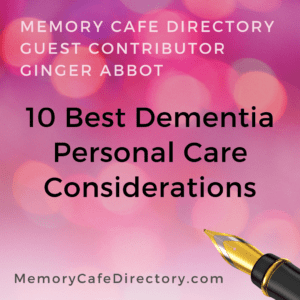Memory Cafe Directory posts and/or links to retailers can be advertising, sponsored, or affiliate links. We may earn a small commission from them. Thank you.
Submitted by Guest Contributor:
Ginger Abbot
Dementia can be one of the hardest conditions to deal with, especially when it strikes someone particularly close to you. Becoming a caregiver means changing your life to help someone else with theirs. At certain times, you should consider not leaving your loved one alone, particularly if they feel vulnerable.
There are personal care considerations for people with dementia you need to make yourself aware of – and these considerations include both self-care and medical services.
Medical Services to Consider for People With Dementia
Personal care goes beyond what a person should do for themselves. It involves keeping up with their appointments to benchmark their health. Taking care of your loved one’s health ensures that you’re up-to-date on their condition. These medical services to consider for people with dementia can help you stay on track while taking care of your favorite patient or loved one.
1 Neurological Appointments
A neurologist may have done an initial examination – and maybe follow-up examinations – to properly assess whether your loved one has dementia. Once you’ve discovered that your loved one has dementia, it’s best to get a check-up with a neurologist every six months to see how the condition is developing.
2 Dental Services
Your loved one may find it harder to take care of their teeth these days. Still, you should encourage them to brush at least once a day to continue their oral health in the bare minimum way. Flossing may be too much for them, but don’t be afraid to step in and help if your loved one needs you to.
You should make regular appointments for your loved one to see the dentist. It might be an unfamiliar place to them, but your presence may help them calm down. A dental assistant can make sure a patient with dementia is comfortable before the dentist comes in.
While it might be a frightening experience for them, you can encourage them to settle down and assure them this dental appointment is for their benefit.
3 General Health Care
Keep up with your loved one’s regular health care checkups, too. Their family doctor may be able to check on them and guide you on medical services to consider for people with dementia, such as how often you should come to check-ups or if they think you should go back to the neurologist more frequently.
Also, keeping a benchmark of your loved one’s overall health is an excellent decision so you can be aware of any sudden changes.
4 Optometrist
As a person gets older, their eyesight declines. Having the correct prescription can help your loved one navigate their home and other environments easily. If they can’t see well, they may find it more difficult to find objects in their home. Make sure your loved one has the right glasses prescription so they can feel more at ease in their home, the most familiar place to them.
5 Dermatologist
If your favorite patient is having skin issues, a trip to the dermatologist may be in order. Their mental state may be causing them to pick at or chew on their skin, to their detriment.
As people get older, their skin thins, so your loved one may need extra help moisturizing and otherwise caring for their skin. A dermatologist can guide you in the right direction to take care of your family member.
Self-Care Considerations for People With Dementia
Self-care can manifest in different ways. Personal care might be a type of self-care for some, and for others, it’s doing something they love. Your favorite patient or loved one could benefit from all kinds of self-care – both regular maintenance and something special.
These self-care considerations for people with dementia can make a difference in how your loved one lives their days.
6 Supervise Their Activities
Your loved one may want to feel a sense of independence when performing basic self-care activities such as bathing or clipping their nails, but just being nearby can be a great safety net for them in case something goes wrong.
For example, if they are more independent, you may choose to stand outside the door if they can still bathe themselves, just in case they need your help or you hear them slip. You can also run the water for them – this way, you know it’s not too hot or too cold for them. Things like safety rails can go a long way in helping your loved one feel safe as well.
Supervising your loved one’s more challenging activities, depending on how advanced their stage of dementia is, could help them lean on you for other activities. You don’t have to act like their parent, either – you can involve yourself in their life and offer to help or ask questions about what they’re doing.
7 Alleviate Their Stress
People with dementia are bound to feel stressed when their loved ones don’t understand them. They may need a relaxing spa day once in a while, too. Figure out what decreases their stress – whether it’s a warm bath, soft music, or a television show that reminds them of their childhood or another time in life.
Figure out what seems to calm them down when they’re worked up so that whenever they’re not feeling their best, you can help them get back on track.
8 Keep Them Stimulated
While too many distractions can be harmful to people with dementia, not enough stimulation can also be detrimental. When you have a task that takes priority, such as eating dinner, you should limit all distractions so you can attempt to hold a conversation with your loved one. They may find it easier to focus on talking to you if they don’t have any outside distractions.
Still, if they don’t have other things to keep them stimulated, they may fall into boredom. Boredom often results in the person feeling like taking a nap. Naps aren’t great for those with dementia, as they can eventually confuse day and night with enough long naps. If your loved one plans to sleep, make sure you limit their amount of naps per day and work them into their routine effectively.
9 Plan an Outing
Something that may make your day easier as a caregiver is getting your loved one out of the house. You’ll both enjoy going out somewhere and experiencing something new, though sometimes keeping up with a loved one with dementia can be challenging and bring you worry. In that case, you should find something low-stress for the two of you to enjoy together.
Memory Cafes are an excellent option to spend time with your loved one, as they emphasize working on activities or other mentally stimulating things as a team. Though these establishments may seem like they can keep your loved one occupied independently, they encourage you to participate in activities with them to better bond with your loved one.
10 Keep It Simple
You don’t have to have a daily schedule filled to the brim to keep your loved one happy. As long as they have someone to talk to, they should enjoy their day. Try to limit things like television to times when you need to do something else. While you shouldn’t leave a person with dementia alone for long, you might be able to complete a task while they are engrossed in a show.
When explaining something to them, keep your instructions simple. When you speak to your loved one clearly, they will likely feel less frustrated than if you expected them to understand and remember a complex series of instructions. When you communicate simply and effectively, everyone in the situation will have less stress.
Keep Up With Personal Care Considerations for People With Dementia
Dementia might make people function differently, but they still need the same care as anyone else. You have plenty of self-care and medical services to consider for people with dementia, though you may find that some don’t resonate with your loved one. Make sure you’re always doing what’s best for your loved one’s health, but you should take care of yourself, too.
Remember that you need to have patience when dealing with someone who has dementia. They may be rediscovering the world or are lost in some point in their past. As you learn and grow with your loved one, navigating the world with dementia will grow easier. Then, you will find that you will cherish these memories together for the rest of your life.
About the Author: Ginger Abbot

Ginger Abbot
Ginger Abbot is a career and lifestyle writer.
Read more of her work on the learning publication Classrooms.
Become a Contributor!
 Do you want to be a Memory Cafe Directory contributor? If you have helpful information to share with our community, read about the guidelines, then get in touch to discuss what you have to offer.
Do you want to be a Memory Cafe Directory contributor? If you have helpful information to share with our community, read about the guidelines, then get in touch to discuss what you have to offer.
Thank you.





